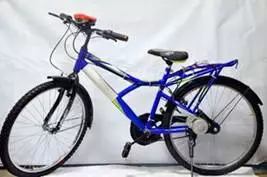

Rapidly charging E-cycle developed with Na-ion batteries and supercapacitors.
<p>
Scientists at IIT Kharagpur have succeeded in developing Sodium-ion batteries which are cheaper than lithium-based batteries, high performing, and can be scaled up to industrial-level production, according to information provided by the Ministry of Science and Technology today.</p>
<p>
Taking advantage of the fact that Sodium-ion batteries can be charged rapidly, the IIT team has integrated it in e-cycles &ndash; an easy, affordable option for the general public.</p>
<p>
Sodium-ion (Na-ion) batteries have triggered academic and commercial interest as a possible complementary technology to lithium-ion batteries because of the high natural abundance of sodium and the consequent low costs of Na-ion batteries.</p>
<p>
The IIT team has used nano-materials to develop Na-ion-based batteries and supercapacitors, which can be rapidly charged and have integrated them in e-cycles. The low-cost Sodium-ion based technologies would be cheap and are expected to reduce the cost of the e-cycles significantly.</p>
<p>
The team led by Professor in the Department of Physics at the Indian Institute of Technology Kharagpur,&nbsp; Dr. Amreesh Chandra, has been researching to develop energy storage technologies, which are based on Na-ion, and his team has developed a large number of nanomaterials.</p>
<p>
The team has used sodium iron phosphates and sodium manganese phosphates which they synthesized to obtain Na-ion-based batteries and supercapacitors with support from the Technology Mission Division (TMD) of the Department of Science and Technology (DST), Government of India. These sodium materials were combined with various novel architectures of carbon to develop a battery.</p>
<p>
The Na-ion cell can also be totally discharged to zero volt, similar to a capacitor, making it a safer option in comparison to many other storage technologies.</p>
<p>
With further development, the price of these vehicles can be brought down to the range of Rs. 10-15,000, making them nearly 25% cheaper than Li-ion storage technologies-based e-cycles.</p>
<p>
As disposal strategies of Na-ion-based batteries would be simpler, it can also help in addressing the climate mitigation issue. The research on the Supercapacitors was published in the Journal of Power Sources, and a few patents are in the pipeline on the use of these Na-ion-based batteries in e-cycles.</p>
<p>
This research activity was funded under the DST&rsquo;s Materials for Energy Storage scheme.</p>
<p>
<strong>Publication Links:&nbsp;</strong> <a href="https://pubs.rsc.org/en/content/articlelanding/2021/ra/d1ra05474k" rel="nofollow">Hierarchical NaFePO4 nanostructures in combination with an optimized carbon-based electrode to achieve advanced aqueous Na-ion supercapacitors&dagger;</a></p>
<p>
<a href="https://www.sciencedirect.com/science/article/abs/pii/S0378775321011745?via%3Dihub" rel="nofollow">Stable Na-ion supercapacitor under non-ambient conditions using maricite-NaMnPO4 nanoparticles</a></p>
<p>
<a href="https://www.sciencedirect.com/science/article/abs/pii/S0378775321011745?via%3Dihub" rel="nofollow"><br />
</a></p>
BRICS Sherpa Secretary (ER) Dammu Ravi participated in the BRICS Sherpas Meeting being held in…
The Border Security Force (BSF) Director General Daljit Chawdhary on Friday met with Union Home…
By Shailesh Yadav Google Gemini, the generative artificial intelligence tool of technology major Google, can…
Union Home Minister Amit Shah spoke with Chief Ministers on Friday and asked them to…
Raja Abid, Chairman of the Revolutionary Students Organisation, has condemned the deteriorating education system in…
Tibetans-in-exile in Shimla observed the 36th birthday of the 11th Panchen Lama, Gendhun Choekyi Nyima,…